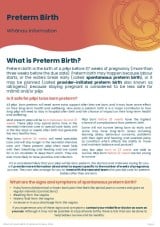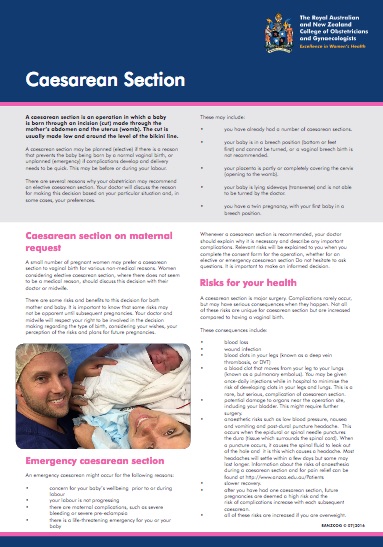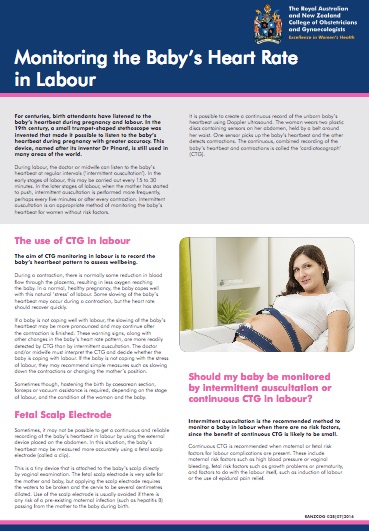You can now add Healthify as a preferred source on Google. Click here to see us when you search Google.
Premature labour and birth
Key points about premature labour and birth
- Premature or pre-term labour is labour that starts before 37 weeks of pregnancy (more than 3 weeks early).
- Any birth at less than 32 weeks of pregnancy is considered very early.
- These babies will need to spend several weeks in a special care baby unit or neonatal unit.
- Babies can survive from as early as 23 or 24 weeks depending on weight, maturity and complications.
- If you have any concerns about your pregnancy, discuss these with your lead maternity carer (LMC) without delay.
- The earlier premature labour is recognised, the better the outlook for your baby.

Premature or pre-term labour is labour that starts before 37 weeks of pregnancy, or more than 3 weeks early. The earlier a baby is born, the less mature and less ready they are to live outside their mother. Due to advances in neonatal care, babies are much more likely to survive and go on to live healthy, normal lives than they were a generation ago.

Image credit: Canva
There are many reasons why you may give birth before your due date. However, if you go into premature labour it's often not possible to know why this has happened. You are at an increased risk of having a premature birth if you:
- have already had a premature baby
- have an ultrasound scan that suggests the neck of your womb (the cervix) doesn't seem strong enough
- are pregnant with twins or triplets
- have had 3 or more miscarriages or terminations
- have had previous treatment to your cervix
- smoke
- are underweight or very overweight
- have poor dental hygiene
- have a medical condition, eg, diabetes.
If your doctor or lead maternity carer (LMC) thinks you're at high risk of premature labour, you may be given a medicine called progesterone to help prevent premature birth.
Some babies are born prematurely because there's a problem that puts the life of the mother or baby at risk, eg, if the baby has stopped growing inside the womb or if the mother’s blood pressure has become dangerously high. In this situation, your LMC may recommend an induction of labour or a Caesarean section.
About 1 in 10 women will have a premature baby. This is the most common reason for a baby to spend some time in a neonatal unit. Due to advances in neonatal care, babies are much more likely to survive and go on to live healthy, normal lives than they were a generation ago.
If you have risk factors for premature birth, your doctor or lead maternity carer (LMC) will refer you to a specialist. However, at least half of the women who go into premature labour will have no risk factors for early delivery, so it's important to know what the signs of premature birth are.
The earlier premature birth is recognised, the better the outlook for the baby. If you have any of the 'ABCs' of premature labour listed below, you should contact your LMC straight away. Usually, an examination and assessment of you and your baby are needed. Sometimes you may need to stay in hospital for observation and treatment.
The ABC of premature labour
A: Abnormal vaginal discharge: Watch for vaginal discharge of water or mucus – sometimes there'll be a small amount of blood. The breaking of the bag of waters around the baby can cause a gush of fluid. This is often one of the first signs of being in premature labour.
B: Bleeding: Vaginal bleeding should always be checked out with your LMC. A ‘show’ is a discharge of mucus and blood that happens before labour starts. It's when the plug in the neck of your womb (the cervix) comes away as your cervix starts to open.
C: Contractions: It can be difficult to tell if contractions are labour contractions or just practice contractions, called Braxton Hicks. Braxton Hicks contractions aren't usually regular and, while they can be uncomfortable, they don't become stronger or more painful over time. They can become more noticeable if you have a full bladder. Try going to the toilet – Braxton Hicks contractions may settle down if your bladder is emptied.
Painful contractions occurring regularly every 15 minutes over a period of more than an hour may mean the start of premature labour. To time the contractions, use your hand to feel your uterus tighten, become hard and then relax. A contraction may last from 30 seconds to about 2 minutes. Time how long it takes from the beginning of one contraction to the start of the next one. Contact your doctor or LMC if you think you're having regular contractions and could be in premature labour.
D: is for Don’t know! Sometimes you just don't know if what you're feeling is OK. Abdominal cramps, pelvic pressure and lower backache can mean labour is starting. You can experience nausea (feel sick) and diarrhoea (runny poo) which can cause bowel pain and discomfort. But these things can happen if you're not in labour too.
It can sometimes be difficult to know if labour is starting. If you feel that something is different call your LMC without delay. They will be able to ask the right questions and decide if anything more needs to be done.
|
|---|
Once you contact your LMC, you may be asked to go to the hospital for assessment. You will be examined to find out whether you are in premature labour and to assess the health of your baby.
If you're in premature labour and it's more than 5 weeks before your due date, you'll probably be given medicine to stop or delay the labour. If your waters haven't broken and labour has stopped, you may be able to go home. If labour can't be stopped, the delay can make time for you to be given medicine to improve the maturity of your baby’s lungs in preparation for birth. The delay is also important because it will give time for transfer to a bigger hospital if necessary. It's much better to transfer a baby inside a mum than in an incubator.
The nurses and doctors in the neonatal units around Aotearoa New Zealand are specially trained to look after premature babies. You'll be able to stay in the neonatal unit to be close to your baby if possible. This will depend on how well your baby is, and how many babies and families the unit is looking after at the time.
If you've had a Caesarean, or have a medical complication, you'll need to stay in the post-natal ward for a few days. The midwives and neonatal nurses will encourage you to breastfeed or express milk and to do many of the things that parents of full-term babies do.
Video: Carosika Collaborative – Katie's story 2 (3:19)
Watch Katie's story about her experience of premature birth.
What are the risk factors for preterm labor and birth?(external link) National Institute of Child Health and Human Development, US
Premature labour(external link) Patient Info, UK
The Little Miracles Trust(external link) NZ
Carosika Collaborative(external link) NZ(external link), information for whānau and healthcare providers including What is pre-term birth?(external link) and Anticipating or planning a pre-term birth - what to expect(external link)
Brochures
Preterm birth – whānau information(external link) Carosika, NZ, 2024
Premature labour what to do? Signs and prevention [PDF, 207 KB] Healthpoint NZ and Counties Manukau Health Maternity Services
Assisted birth(external link) RANZCOG
Caesarean section(external link) RANZCOG
Monitoring the baby's heart rate in labour(external link) RANZCOG, Australia
What to expect when it wasn't what you expected(external link) The Little Miracles Trust, NZ
Apps
References
Premature labour(external link) Patient Info, UK, 2020
Brochures

Preterm birth – whānau information Carosika, NZ, 2024

RANZCOG, 2021

RANZCOG, Australia, 2016
Credits: Healthify editorial team. Healthify is brought to you by Health Navigator Charitable Trust.
Reviewed by: Dr Emma Dunning, Clinical Editor and Advisor
Last reviewed:
Page last updated:





